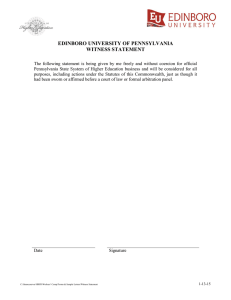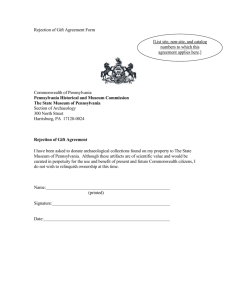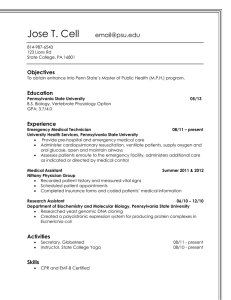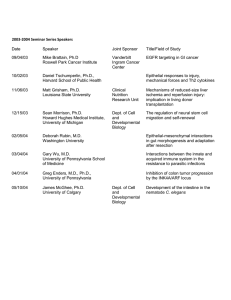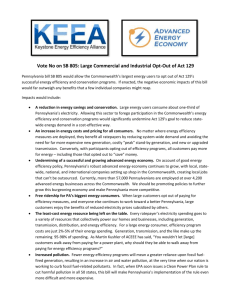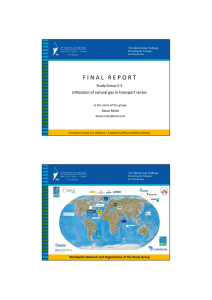NGV A ROAD MAP TO A NATURAL GAS VEHICLE FUTURE
advertisement
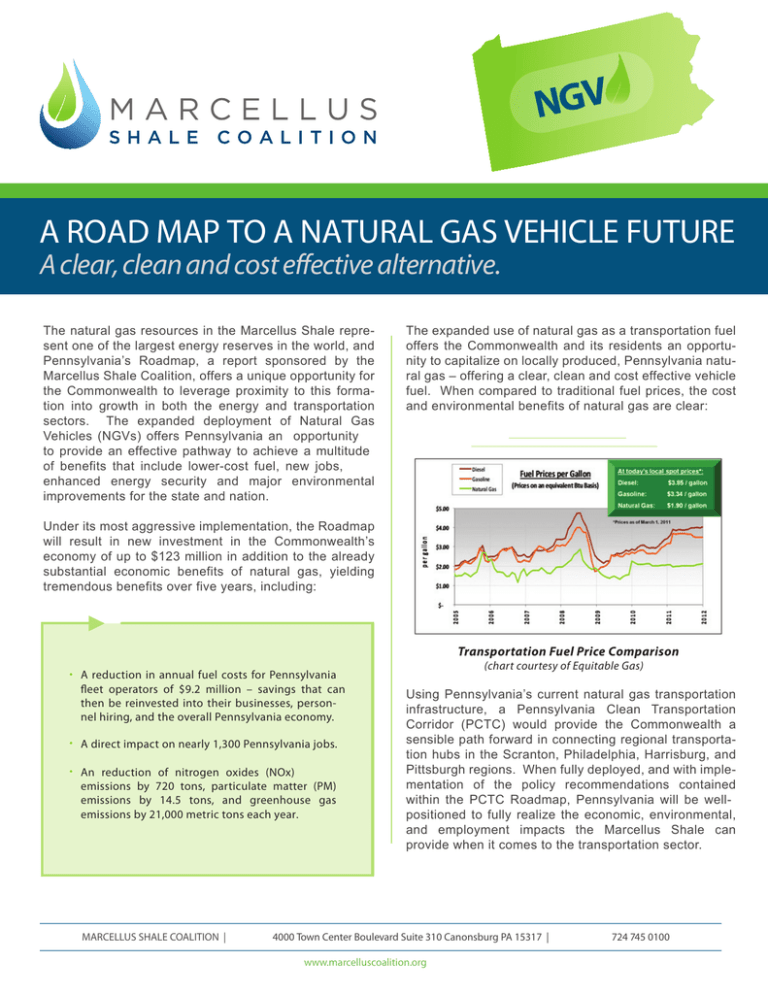
NGV A ROAD MAP TO A NATURAL GAS VEHICLE FUTURE A clear, clean and cost effective alternative. The natural gas resources in the Marcellus Shale represent one of the largest energy reserves in the world, and Pennsylvania’s Roadmap, a report sponsored by the Marcellus Shale Coalition, offers a unique opportunity for the Commonwealth to leverage proximity to this formation into growth in both the energy and transportation sectors. The expanded deployment of Natural Gas Vehicles (NGVs) offers Pennsylvania an opportunity to provide an effective pathway to achieve a multitude of benefits that include lower-cost fuel, new jobs, enhanced energy security and major environmental improvements for the state and nation. The expanded use of natural gas as a transportation fuel offers the Commonwealth and its residents an opportunity to capitalize on locally produced, Pennsylvania natural gas – offering a clear, clean and cost effective vehicle fuel. When compared to traditional fuel prices, the cost and environmental benefits of natural gas are clear: Under its most aggressive implementation, the Roadmap will result in new investment in the Commonwealth’s economy of up to $123 million in addition to the already substantial economic benefits of natural gas, yielding tremendous benefits over five years, including: Transportation Fuel Price Comparison • A reduction in annual fuel costs for Pennsylvania fleet operators of $9.2 million – savings that can then be reinvested into their businesses, personnel hiring, and the overall Pennsylvania economy. • A direct impact on nearly 1,300 Pennsylvania jobs. • An reduction of nitrogen oxides (NOx) emissions by 720 tons, particulate matter (PM) emissions by 14.5 tons, and greenhouse gas emissions by 21,000 metric tons each year. MARCELLUS SHALE COALITION | (chart courtesy of Equitable Gas) Using Pennsylvania’s current natural gas transportation infrastructure, a Pennsylvania Clean Transportation Corridor (PCTC) would provide the Commonwealth a sensible path forward in connecting regional transportation hubs in the Scranton, Philadelphia, Harrisburg, and Pittsburgh regions. When fully deployed, and with implementation of the policy recommendations contained within the PCTC Roadmap, Pennsylvania will be wellpositioned to fully realize the economic, environmental, and employment impacts the Marcellus Shale can provide when it comes to the transportation sector. 4000 Town Center Boulevard Suite 310 Canonsburg PA 15317 | www.marcelluscoalition.org 724 745 0100 PCTC Infrastructure Effective implementation of the Roadmap will require state leadership in developing key policies, partnerships, and incentive programs to support the program. Public policy recommendations include: • Clear policy agreement that NGVs represent a unique economic and environmental opportunity for Pennsylvania consumers. From procurement incentive programs for municipal and state fleets, to education forums for key stakeholders, to access to high occupancy vehicle (HOV) lanes for single occupant NGV drivers, a singular and defined message of Pennsylvania’s commitment to NGVs will provide business and individual consumers the ability to gain confidence in this emerging market and position the Commonwealth as the nation’s leader in NGV policy and technology. Policymakers also may signal an increased commitment to NGVs through the establishment of a select committee on NGV use in the state’s transportation sector; incentives for using natural gas as vehicle fuel; encouragement of the state’s regulated utilities to more aggressively participate in the NGV market; and the issuance of NGV project development bonds. • Allowance of U.S. EPA certified bi-fuel NGVs in the Pennsylvania market. A major obstacle for natural gas light-duty cars and trucks is Pennsylvania’s Clean Vehicles program. This program officially adopted certain provisions of the California Low Emission Vehicle Program, which established alternative fuel restrictions that have made it much more difficult and expensive to use NGVs, particularly those using compressed natural gas. The allowance of EPA certified NGVs in the Clean Vehicles Program, including bi-fuel vehicles, will significantly increase the market penetration of the technology on behalf of the Commonwealth’s consumers, and stimulate the growth of a more comprehensive NGV refueling network without impacting emissions. • Clear push for regional planning and partnership development to support effective long-term growth of the regional NGV market. Cooperating in advancing the Roadmap will enable policymakers, business interests, and other stakeholders to position Pennsylvania as a regional and national leader in natural gas vehicle use and cleaner and more cost effective transportation. The development of this Roadmap will put Pennsylvania at the leading edge of the nation’s effort to address critical challenges on energy security, fuel costs, economic recovery, job creation and air quality. It also will make Pennsylvania the hub of clean corridor development in the eastern United States. Framing the Roadmap in the broader context of a national domestic and international fuel infrastructure will be critical to underscore the big picture objectives of this initial highly-focused effort. MARCELLUS SHALE COALITION | 4000 Town Center Boulevard Suite 310 Canonsburg PA 15317 | www.marcelluscoalition.org 724 745 0100
